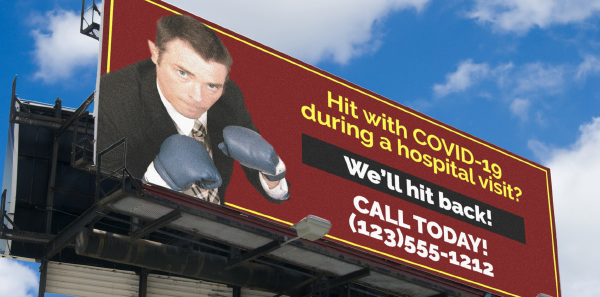
Physicians are used to seeing billboards and daytime television advertisements for plaintiff’s attorney firms. Our reactions to these ads usually range from indifference to annoyance. But recently, plaintiff’s attorneys were called out publicly for advertisements actively soliciting COVID-19 malpractice cases. A few of these advertisements were shared widely on social media, with resultant incensed commentary from physicians and the public alike. This eventually forced a retraction and public apology from at least one firm.
Explore This Issue
ACEP Now: Vol 39 – No 10 – October 2020Health care workers, particularly physicians, are preyed upon by unethical attorneys all the time, yet we rarely raise any public outcry. Why did this cause such vocal protest?
Physicians are caring for COVID-19 patients while risking our own health and the health of our families, often with inadequate personal protective equipment. We are being strained in unprecedented ways. Also, the adverse outcomes in this pandemic are largely out of our control. Treatment options for COVID-19 are few and unproven. The virus has an unpredictable course, and unexpected deaths are common. Scarcity of resources can also affect outcomes. Surge plans may leave emergency physicians working in the ICU or medical floor or managing improvised pop-up ICUs in their own departments. Many external factors ensure that undesirable outcomes will be increased overall—and yet, these advertisements suggest that physicians, as always, should be the scapegoats when anything goes wrong.
Consider this hypothetical case: A middle-aged man presents with influenza-like symptoms in the setting of the COVID-19 pandemic. He is febrile, with otherwise normal vitals. A chest X-ray is normal. A COVID-19 test is sent but will not return for several days. He is discharged to home, with return precautions and outpatient follow-up. At home, he worsens. He returns to the emergency department several days later and dies after a cardiac arrest at the time of intubation. Setting aside the grief of the patient’s family and the physician at this terrible outcome, can the physician be sued?
Can the physician be held liable for malpractice?
Tricky Question of Liability
Yes, the physician can be sued, even in states with new liability protections in place that relax the legal standard for malpractice. However, whether that physician is held liable is determined by a jury at the time of trial. Juries eventually determine liability based on instructions given to them by the court on how to weigh evidence and what rules to follow. New emergency declarations in many states offer liability protections during the pandemic, sometimes using the term “immunity.” Most of these are based in some fashion on model federal legislation (the Model State Emergency Health Powers Act, or MSEHPA) from 2001, which was drafted to help states prepare for the possibility of bioterrorism or other public health emergencies.
Physicians would like the word “immunity” to mean that patients cannot file lawsuits against them during this time. But sadly, that is not the case. Anyone can file a malpractice lawsuit, liability protections notwithstanding. And once the suit has been filed, it will need to be defended. If you are served, you will have to go through the stress of litigation until the case is tried in court and your liability is determined—or until the case is settled or dropped.
So what does immunity mean during the COVID-19 emergency, if it doesn’t mean you can’t be sued?
Ordinarily, juries determine liability using the “standard of care,” which is defined differently in different states and generally means what a minimally competent and similarly trained physician might do in circumstances similar to the one in question. In many states that have enacted liability protection, the physician is immune from liability except in the setting of “gross negligence or willful misconduct.” These terms also are defined differently in each state, but in general, willful misconduct means a physician intentionally harmed someone, while gross negligence is showing wanton disregard for basic care of human beings.
The actual degree of liability protection varies from state to state, so it is important to know the current law where you practice. Some states are granting immunity to any care rendered during the pandemic, while others apply it only to COVID-19 patients. Still others require you to be working on behalf of the state in order to be protected.
In terms of federal legislation, on March 17, 2020, a declaration was published under the 2005 Public Readiness and Emergency Preparedness (PREP) Act to provide liability immunity for activities related to “medical countermeasures” against the ongoing COVID-19 pandemic. This is not thought to protect physicians from usual care rendered during COVID-19, but this will be considered on a case-by-case basis. In general, the liability immunity applies to those involved in the development, manufacture, testing, distribution, administration, and use of medical countermeasures described in the declaration. However, you should always document that you are potentially caring for COVID-19 patients in case the act might apply in some way in your defense should a lawsuit be filed.
Even though lawsuits still may be filed, these new protections are potentially helpful. Plaintiff’s attorneys know that any case related to care during this time will be a very steep climb for them, and hopefully, this will be a significant deterrent. Juries are unlikely to forget the esteem that the public holds health care workers in right now, even if a trial is years away. These protections are not ironclad, but they may give you more peace of mind.
In states with no additional protections in place, the worst-case scenario is that a physician is held to the usual standard of care. But it is critical to remember that the standard of care changes with context and circumstances. The circumstances right now are pandemic circumstances. Juries will take that into account.
Protection in Documentation
The best advice I have for risk mitigation—other than taking good care of your patients—is to document well. COVID-19 care documentation is required to even consider application of the PREP Act. Be sure to explain any deviations from usual practice that are due to the pandemic. Document if hospital capacity or concern for the nosocomial transmission of COVID-19 factored into any decisions to discharge or admit a patient. Make sure your patients understand their discharge instructions and return precautions, and document that as well. Even for non-COVID-19 patients, consider charting a statement such as “…as this patient was seen during the COVID-19 pandemic, they were queried about fever, cough, [etc.].” This makes it clear that the patient is being seen at a time when hospital capabilities may not be at their norm.
There are other important ways to protect yourself legally. If you find yourself practicing outside of your usual environment, it is crucial that you are in touch with your insurance carrier to apprise them of those changes. You want to be assured in writing that you have coverage extending to any new activities.
Last spring, many physicians volunteered in hard-hit areas across state lines; some physicians even came out of retirement to help. In these situations, there are some federal protections against liability, and some states have their own sets of protections for volunteers. On March 27, 2020, the Coronavirus Aid, Relief, and Economic Security (CARES) Act became active law; it includes Good Samaritan language that provides additional federal liability protections. Physicians and other health care professionals who provide volunteer medical services during the pandemic will not be held liable for care relating to COVID-19—again, except in cases of gross negligence or willful misconduct. The federal law supersedes any state laws that are less protective.
While all of this is helpful for volunteers, do not rely exclusively on these protections. You must have adequate malpractice insurance coverage for your volunteer activities. If a lawsuit is filed, it is crucial that you are covered, as an attorney will be required to defend your case and demonstrate whether these acts even apply. Attorney’s fees will be thousands of dollars if paid out of pocket. It is much better to have proof of insurance coverage in writing, likely through your volunteering program. It is also important that your license is fully in order to practice in whatever state you may find yourself working.
Take proactive steps to protect yourself the best you can. Then go back to taking good care of your patients, knowing you have taken the necessary steps to take care of yourself.
 Dr. Pensa is clinical associate professor of emergency medicine at the Warren Alpert Medical School of Brown University in Providence, Rhode Island; associate director (education) of the Emergency Digital Health Innovation program at Brown; and creator and host of the podcast “Doctors and Litigation: The L Word.”
Dr. Pensa is clinical associate professor of emergency medicine at the Warren Alpert Medical School of Brown University in Providence, Rhode Island; associate director (education) of the Emergency Digital Health Innovation program at Brown; and creator and host of the podcast “Doctors and Litigation: The L Word.”
Pages: 1 2 3 | Multi-Page




One Response to “Malpractice Litigation in the Era of COVID-19”
November 15, 2020
Margaret PixleyAn informative article highlighting the subtleties of malpractice protection during the Covid-19 public health crisis. The emphasis on protective documentation is much appreciated from the medical student perspective (still learning the value and application of careful documentation in the EHR).